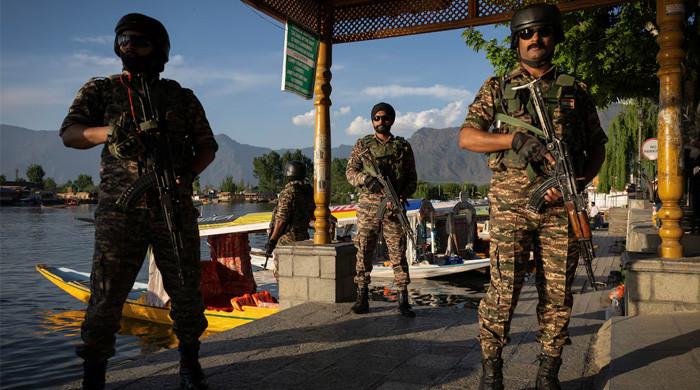India Seeks Global Support Amidst Rising Tensions with Pakistan
Following a tragic gun assault in Indian Illegally Occupied Jammu and Kashmir (IIOJK), India is actively pursuing international support. This action appears aimed at bolstering its rationale for potential military intervention, rather than seeking de-escalation.
According to the New York Times, the possibility of a dangerous confrontation between the two nuclear-armed nations is growing, despite limited definitive evidence directly linking Pakistan to the incident.
The NYT report indicates that Indian Prime Minister Narendra Modi has been in contact with numerous global leaders in a series of urgent diplomatic discussions following the recent attack. Furthermore, authorities have reportedly summoned representatives from numerous foreign missions to the Ministry of External Affairs for significant briefings.
However, this endeavor is not primarily focused on garnering assistance to alleviate India’s tense standoff with Pakistan, which it implicates as having connections to the assault. Instead, sources suggest that New Delhi is constructing a case to justify military measures against its neighbor. Modi pledged severe consequences and the destruction of terrorist havens in a speech, without mentioning Pakistan by name.
In the occupied territory, Indian security forces have initiated widespread crackdowns, detaining many people as they continue their search for those responsible.
Previously, India stated its intention to disrupt water flow to Pakistan, whose agricultural system relies heavily on rivers originating upstream. It also mandated the immediate departure of certain personnel from Pakistan’s diplomatic mission, as well as Pakistani citizens visiting India.
Islamabad has responded by announcing that it will suspend involvement in bilateral agreements, including one pertaining to the “line of control” that defines the border between the two countries in the contested areas where a ceasefire had been in effect for several years.
Furthermore, anti-Muslim sentiments are reportedly escalating in India, with Kashmiri students attending universities in other Indian cities encountering extensive harassment, prompting many to return to their homes.
Despite the passage of five days since the terrorist act that resulted in the deaths of numerous civilians, India has not formally identified the group responsible for the carnage. The Indian government has presented minimal public evidence to substantiate its accusations against Pakistan, which denies any involvement.
According to diplomatic sources, Indian officials have referenced Pakistan’s prior support for groups designated as terrorists targeting India during briefings to diplomats at the foreign ministry. Indian officials have noted that their investigation remains ongoing, alluding briefly to technical intelligence, encompassing facial recognition data, that connects the perpetrators of the recent attack to Pakistan.
Analysts and diplomats suggest that the limited substantiating evidence presented thus far indicates either that India requires additional time to collect information pertaining to the terrorist attack prior to engaging Pakistan, or that it perceives minimal necessity to justify its intended actions, particularly amidst prevailing global instability.
A military clash between India and Pakistan, both possessing nuclear weapons, carries the inherent risk of rapid escalation, which could prove challenging to contain. Nevertheless, India faces limited global pressure to restrain its response and has exhibited increased assertiveness in recent years, corresponding with its augmented diplomatic and economic influence.
The governments of Iran and Saudi Arabia have engaged with both parties, with Iran’s foreign minister publicly offering to mediate. The United Nations and the European Union have urged de-escalation and discussion. However, prominent nations, notably the United States, are preoccupied with other crises. Consequently, analysts believe that India interprets expressions of support from numerous countries for its pursuit of justice as an implicit endorsement of its chosen measures.
Officials from the Trump administration have conveyed strong support for India’s counterterrorism efforts. President Trump has affirmed his amicable relations with both India and Pakistan, while acknowledging their longstanding disagreements.
However, the extent of Washington’s involvement in the present conflict remains uncertain. Three months into his tenure, Trump has not yet designated an ambassador to India, underscoring the relative priority assigned to South Asia on his agenda.
Even should the United States or other nations attempt to intervene in the conflict, their influence may be constrained. India and Pakistan have engaged in multiple wars concerning Kashmir.
Daniel Markey, a senior fellow at the Johns Hopkins University School of Advanced International Studies, noted that the initial reaction from Washington mirrored the approach adopted by the initial Trump administration during the previous significant escalation concerning Kashmir in 2019.
That confrontation stemmed from an assault that resulted in the deaths of numerous Indian security personnel. The association of the assailants – a militant faction identified as Jaish-e-Muhammad – was more explicit.
During that period, the Trump White House conveyed support for India. The administration amplified its diplomatic efforts to promote restraint exclusively after India had initiated retaliatory measures against Pakistan through a cross-border aerial assault.
The extent of the strike’s repercussions was disputed. Subsequently, as Pakistan took measures to retaliate, it engaged in aerial combat and downed an Indian aircraft, resulting in the pilot being taken captive.
Markey stated that, to compensate for that mishandled response, all indications presently suggest a desire on the part of India to undertake “something spectacular.” Pakistan has pledged to reciprocate and surpass any assault initiated by India.
Markey cautioned that the “tit-for-tat cycle could accelerate swiftly, and both India and Pakistan harbor inflated perceptions of their respective capacities to manage escalation.”
In contrast to the terrorist assault in 2019, the claims of accountability for the recent mass killing have been ambiguous, with even information pertaining to the precise quantity of assailants remaining uncertain.
The report indicated that the ambiguity may elucidate India’s emphasis on Pakistan’s “past patterns.”
However, this strategy, employed prior to India disclosing its evidence, even in private diplomatic exchanges, has elicited some skepticism given the magnitude of the escalation. One diplomat privately questioned the prudence of initiating hostilities with a nuclear-armed neighbor predicated solely on historical trends.



Comments (0)
No comments yet. Be the first to comment!
Leave a Comment